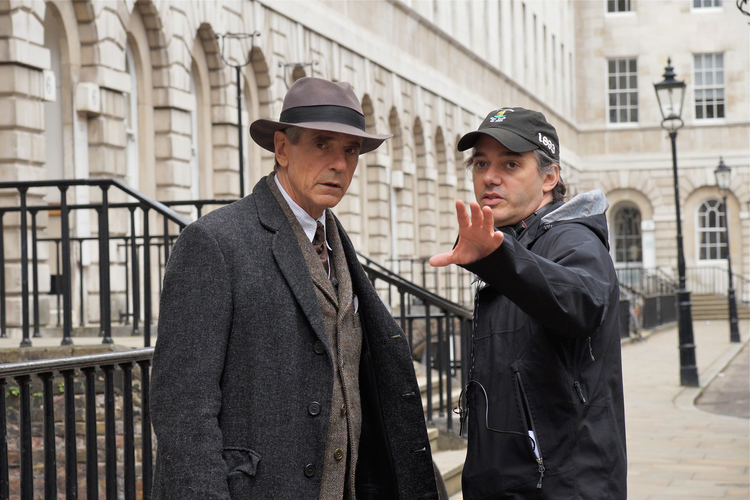|
Reviews
|
|
|
| Courtesy of Mongrel Media |
| 'The Man Who Knew
Infinity' (2015) Dir. Matthew Brown |
| |
 |
| |
| Courtesy of Mongrel Media |
|
|
|
| |
| |
| For those of us not overly familiar with the world of theoretical mathematics the name Srinivasa Ramanujan (Dev Patel) will probably not conjure up any signs of recognition. But be not dissuaded from this opportunity to
venture into this world in a well-told and beautifully filmed biography based on the 1991 book by Robert Kanigel
of the same name. The story of a poor, minimally educated, yet brilliant mathematician from Madras, India who
finds his way into the hallowed halls of Trinity College, Cambridge and worldwide recognition is equally about
his champion and mentor, G.H. Hardy (Jeremy Irons). Their collaborative work is considered seminal in the
advancement of mathematics and the experience was described by Hardy as “the one romantic incident in my
life.” Opening scenes shot in India show Ramanujan feverishly scribbling theorems with chalk on floors, walls and
anything else he can find. Paper is scarce and he is obsessed. He dreams about numbers and formulas and he sees
patterns in everything around him - flowers, clouds, grains of sand. To him they are interlinked and must be
recorded. His prodigal talent is recognized at an early age but his circumstances are an obstacle to realizing his
potential. When finally he gets a job as a low level clerk in an accounting firm he is fortunate enough to be hired
by someone with enough contacts to encourage him to pursue his talent and get his work published. The letter he
sends to Prof. Hardy at Cambridge would have been laughingly dismissed had it not been accompanied by
copious pages of new and original formulas and theorems. This is the most exciting thing to have happened to
the dedicated academician who moves heaven and earth to arrange for him to come to Cambridge. |
| |
 |
| Courtesy of Mongrel Media |
| |
| The contrast between the two men could hardly be more stark. The world-weary man of science and avowed atheist confronted by an intuitive autodidact who is possessed of endless promising theorems which he can barely explain much less prove is the biggest challenge he has faced and he stakes his career on it. The challenges for Ramanujan are monumental.He has never even worn closed shoes. He is a devout Hindu and vegetarian, totallyunworldly and completely mystified by the intricacies of academic and social stratification at Trinity. He is analien creature in the arcane and rarified world of Cambridge, England just prior to WWI. |
|
|
| Accepting Submission for Issue no. 15 - place - Deadline june 1, 2016 |
| Dev Patel is such an engaging actor and brings an eager, earnest innocence to the character of Ramanujan who is torn between his drive to share his insights with the wider world and his traditional attachment to his family, religious beliefs and country. Jeremy Irons reveals the complex character of G.H. Hardy, as a shy insular intellectual with an absolute belief in mathematics as the highest form of beauty and perfection. As these two men work together he discovers that Ramanujan is not driven by ego but by the fact that he receives his knowledge from his patron deity and believes all of his theorems are sacred reflections of the mind of God. This is anathema in the world of academia at Cambridge where the only currency is proof. Yet the prodigious and precocious originality of thought and ideas make it impossible to dismiss. Something in Hardy’s protective shell and core beliefs are breached and the entire establishment is dramatically brought around. The man and his work are embraced and acclaimed by the world. All too soon he is gone. But the work lives on. |
| |
 |
| Courtesy of Mongrel Media |
| It is an amazing story about a phenomenal character, beautifully acted, with gorgeous locations, lush cinematography and all of the production values that a BBC film junkie like myself could wish for. I found it thoroughly engaging and extremely moving. |
| Text by Belle McIntyre |
| |
| refer: Film Review: 'The Man Who KnewInfinity' (2015) Dir. Matthew Brown (pdf) |
| |
| |



